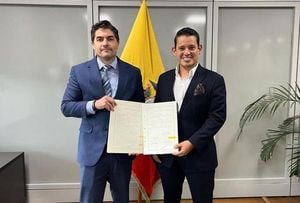Agents from the FBI raided the office of Joseph Molina Flynn, a prominent immigration attorney and Central Falls municipal court judge, on Thursday morning, triggering significant reactions from both the legal community and the public.
The operation occurred at the Dorrance Street office located in downtown Providence, Rhode Island. Several sources confirmed the search, and officials stated it was authorized by a court-issued search warrant. Although many were left speculating about the reasons behind the search, the FBI has not released specific details. This silence surrounding the investigation has fueled curiosity about the motives and potential outcomes of this unprecedented action.
The raid led to immediate consequences for Molina Flynn. Following the FBI search, he resigned from his judicial post. His position was particularly noteworthy as he made history as the first undocumented person to serve on the municipal bench, having previously entered the United States as an undocumented immigrant before becoming an attorney.
Mayor Maria Rivera addressed the incident with concern, stating, "I was deeply concerned to see the reports of an FBI search at the law office of Joseph Molina Flynn. The Central Falls community knows, transparency and accountability are priorities of mine." She emphasized her dedication to maintaining the integrity of the Municipal Court, which led to Molina Flynn’s departure from his position. Rivera announced Associate Judge Robert McConnell would temporarily fill the position until it is officially filled.
This situation highlights not only the personal ramifications for Molina Flynn but also raises significant questions about the intersection of immigration law enforcement and the judiciary. It challenges existing narratives surrounding undocumented individuals within the U.S. legal system, particularly those who ascend to positions of authority and influence.
Joseph Molina Flynn’s story began when he arrived in the U.S. from Colombia as a young immigrant. His unique background and eventual success as an attorney made him a symbol of possibility for many. Now, the FBI raid and his resignation exemplify the precarious nature of such achievements within changing political and legal landscapes.
Reactions to the raid vary among community members and legal experts. Some view Molina Flynn's rise and subsequent fall as reflective of larger systemic issues affecting immigrants, particularly those with complex legal backgrounds. Others are concerned about the ethical and legal responsibilities of public officials, advocating for diligence and accountability.
This incident also taps directly onto the broader narrative of law enforcement targeting individuals within the immigration sector and calls for scrutiny of the systems at play. The FBI's actions against someone of Molina Flynn’s stature raise questions about how such emblems of success are perceived within contentious immigration debates.
Following the investigation, many are watching closely to see how this situation evolves, both for Molina Flynn personally and for the wider discussions about the role of immigration lawyers and judges within the legal architecture of the United States.
This unprecedented FBI investigation will likely draw continued media attention and public scrutiny, as it encapsulates many of the struggles and triumphs tied to immigration policy and justice. The ramifications could extend beyond Molina Flynn, potentially impacting public trust and legal practices within immigrant communities.
While the exact motivations behind the investigation remain murky, the story serves as a cautionary tale about the vulnerabilities faced by individuals within the immigration system, particularly those who find themselves serving dual roles as advocates and adjudicators. Tensions remain high, and many await clarity on what the future holds for Joseph Molina Flynn and his legacy.



